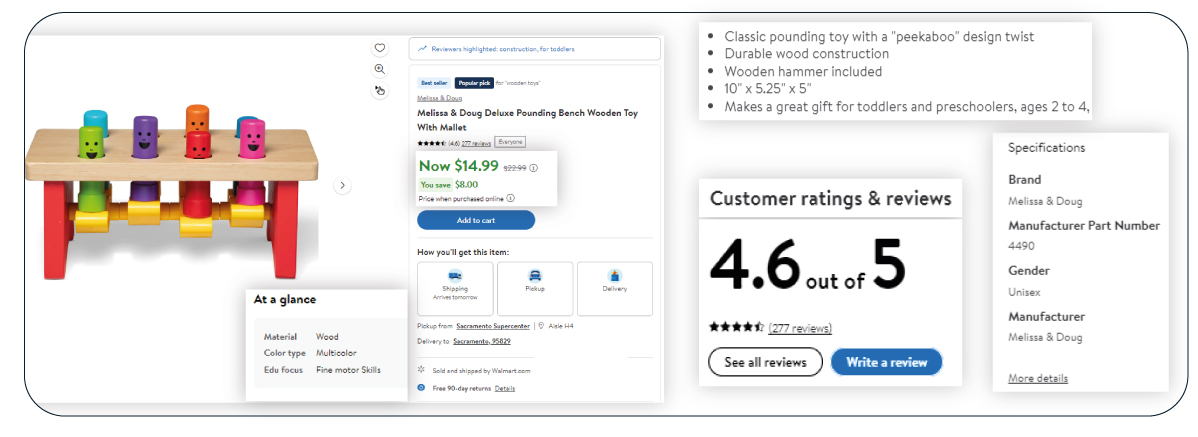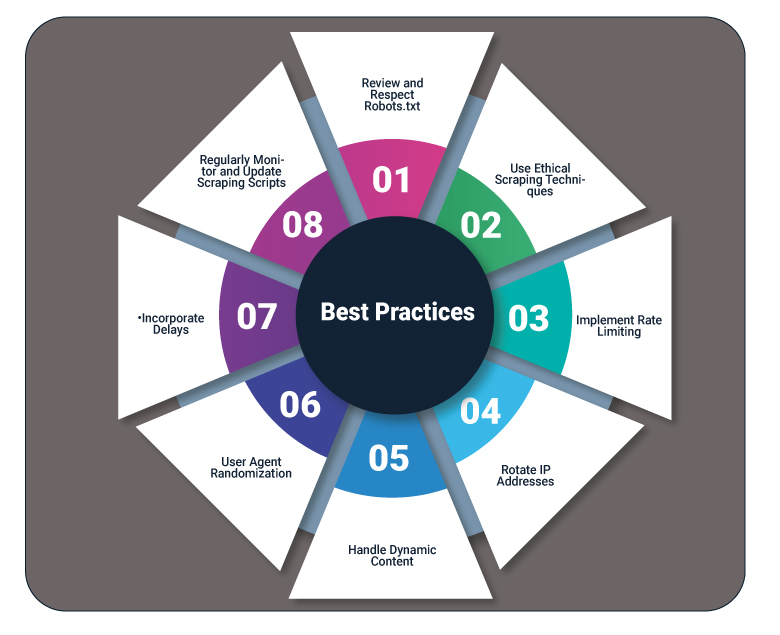
In the fast-paced realm of e-commerce, maintaining a competitive edge necessitates businesses to extract valuable insights on product trends, pricing strategies, and customer preferences. For those operating in the baby products sector, scraping data from major retailers such as Walmart, Amazon, Target, and Kroger becomes crucial for strategic decision-making. This article will explore how to scrape baby product data from Walmart, Amazon, Target & Kroger. Effective extraction of this data can give businesses actionable information, empowering them to make informed decisions and stay attuned to market dynamics.
List of Data Fields

Product Information:
- Product names
- Product descriptions
- Product specifications and features
Pricing Details:
- Regular prices
- Discounted prices
- Promotional prices
Customer Reviews:
- User ratings
- Customer reviews and feedback
- Popular or trending products based on reviews
Inventory Status:
- Stock availability
- Out-of-stock information
Product Categories:
- Categorization of baby products
- Subcategories and classifications
Images and Multimedia:
- Product images
- Additional multimedia content
Promotional Information:
- Discounts and promotions
- Bundle offers and deals
Seller Information:
- Seller details
- Ratings and reviews for sellers
Shipping Details:
- Shipping options
- Delivery times
Product Variants:
- Different versions or colors of a product
- Sizes and dimensions
Product Availability Across Retailers:
- Comparison of product availability on multiple platforms
Brand Information:
- Brand names
- Brand-specific product ranges
Walmart: It is a retail behemoth for businesses seeking to glean crucial insights through web scraping techniques. The ability to scrape Walmart product data empowers companies in diverse industries, including the competitive baby products market. Leveraging advanced scraping methods allows businesses to extract valuable information on trends, pricing strategies, and customer preferences, fostering a data-driven approach to decision-making and ensuring a heightened competitive edge in the dynamic e-commerce landscape.

Amazon: Amazon, a global e-commerce titan, is a treasure trove for businesses aiming to extract valuable intelligence by scraping Amazon product data. This strategic approach allows enterprises, especially in the baby products sector, to gather insights on market trends, competitive pricing, and consumer preferences. Leveraging advanced techniques to scrape Amazon product data provides a competitive advantage, enabling businesses to make informed decisions based on comprehensive data analysis, stay agile in the market, and align their strategies with ever-evolving customer demands.

Target: Target, a prominent retail destination, offers a rich source of information for businesses seeking to scrape Target product data strategically. Employing advanced web scraping techniques enables enterprises, particularly in the baby products industry, to access valuable insights on product trends, pricing dynamics, and consumer preferences. Extracting and analyzing data from Target's platform allows businesses to refine their strategies, stay ahead in the competitive market, and make informed decisions that align with the growing demands of their target audience.

Kroger: Kroger, a major player in the retail landscape, presents a valuable opportunity for businesses aiming to glean insights by strategically scraping Kroger product data. Leveraging advanced web scraping techniques, particularly in the baby products sector, allows enterprises to extract pertinent information on market trends, pricing strategies, and consumer preferences. Accessing and analyzing data from Kroger empowers businesses to make informed decisions, refine their strategies, and maintain an edge in the rapidly evolving retail environment, catering to the evolving needs of their customer base.

How Businesses Can Benefit from Scraped Babay Products Data from E-commerce Websites?
- Supply Chain Optimization: Scraped data aids businesses in optimizing their supply chain by providing insights into demand patterns. It enables more efficient procurement, distribution, and supply chain management for baby products.
- Quality Improvement: Analysis of customer reviews and feedback obtained through scraping allows businesses to identify areas for product improvement. This information can enhance the quality and features of baby products, addressing customer concerns and increasing overall satisfaction.
- Promotion and Marketing Strategies: Businesses can develop targeted promotion and marketing strategies based on scraped data. Understanding which baby products are trending, what features are in demand, and how competitors are positioning their products helps craft effective marketing campaigns that resonate with the target audience.
- Seasonal Planning: Scraped data provides insights into seasonal trends and fluctuations in demand for baby products. This information helps businesses plan inventory, marketing, and promotions more effectively, aligning strategies with seasonal consumer preferences.
- Customer Retention: Businesses can identify customer preferences and tailor loyalty programs or retention strategies by analyzing scraped data. Understanding what keeps customers engaged and satisfied allows companies to build lasting relationships and foster customer loyalty.
- Diversification Opportunities: The diverse data obtained through scraping enables businesses to identify opportunities for product diversification. By understanding gaps in the market and evolving consumer needs, companies can expand their product offerings strategically, tapping into new market segments.
- Adaptation to Regulatory Changes: Scraped data can be instrumental in monitoring and adapting to regulatory changes affecting the baby products industry. Staying informed about compliance requirements and consumer expectations ensures businesses can adjust their strategies to meet industry standards and maintain customer trust.
Conclusion: Thus, scraping baby product data from major retailers such as Walmart, Amazon, Target, and Kroger provides businesses in the industry with a wealth of actionable insights. This data-driven approach empowers companies to stay abreast of market trends, optimize pricing strategies, and make informed decisions for strategic growth. By leveraging advanced scraping techniques, businesses can enhance their competitive edge, refine inventory management, and cater to evolving customer preferences. By embracing ethical scraping practices and utilizing the extracted data judiciously, organizations can navigate the dynamic e-commerce landscape with precision, ensuring a robust foundation for success in the ever-evolving baby products market.
At Product Data Scrape, our commitment to unwavering ethical standards permeates every aspect of our operations. Whether delivering Competitor Price Monitoring Services or engaging in Mobile App Data Scraping, our global presence across multiple offices ensures the steadfast delivery of exceptional, transparent services. We tailor our offerings to meet the diverse requirements of our esteemed clients, aiming for consistent excellence in every service provided.







































.webp)




.webp)
.webp)
.webp)